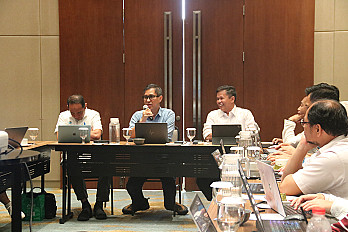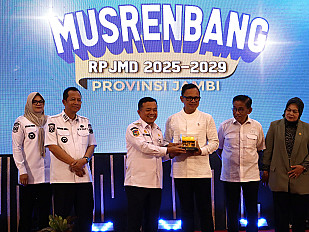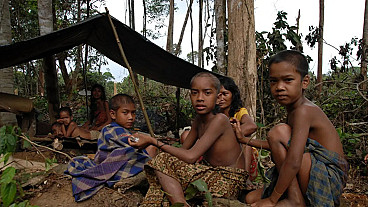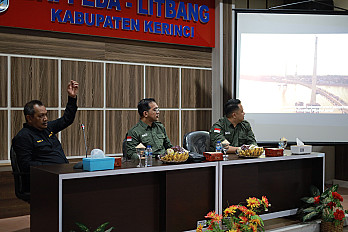News
BioCF-ISFL in Jambi and good practices for reducing GHG emissions

Portal BIOCF
Monday, 18 November 2024 Post 12:11 AMThe world is currently facing a major challenge in maintaining a balance between economic development and environmental sustainability. Indonesia, as one of the world's most biodiverse countries, has a major responsibility in the global effort to reduce carbon emissions and conserve its natural resources. One initiative that provides hope for the future of sustainable development in Indonesia is the BioCarbon Fund Initiative for Sustainable Forest Landscapes (BioCF-ISFL) program implemented in Jambi.
BioCF-ISFL is one of the World Bank's programs that aims to support sustainable forest land management with a holistic approach. This program not only aims to reduce deforestation and land degradation, but also to improve the welfare of communities living around forest areas. This is why the program is highly relevant to the concept of sustainable development that includes economic, social, and environmental aspects. Jambi was chosen as the location for the program implementation because the province has rich forests that are one of the main pillars of the Sumatran ecosystem. However, the land in this province is also one of the largest contributors to greenhouse gas (GHG) emissions due to deforestation and forest degradation. Through this program, the Government of Indonesia is committed to reducing emissions as much as possible, a move that will not only impact the local environment but also the global one.
Phase of ImplementationThe implementation of the project is divided into several phases, with the pre-investment phase taking place in 2021-2025 being an important first step. In this phase, important interventions are made to strengthen institutions and policies related to sustainable land management. The goal is clear: to encourage changes at the policy level and implementation on the ground to be more aligned with emission reduction efforts. One indicator of the success of this program is the area of land that is managed sustainably.
In the first semester of 2024, 268,630 hectares of land in Jambi have been managed with an approach oriented towards emission reduction. Although this figure has not yet reached the 2025 end target, this achievement shows that landscape management efforts in Jambi Province are already on the right track. This management includes reforestation, land restoration, and sustainable forest management that involves various parties, including the private sector. However, the implementation of this project is not without challenges. Tenurial issues, land use conflicts, and forest fires are still challenges that need to be overcome.
One of the solutions proposed in the report is the implementation of social and environmental safeguards, as well as map-based conflict resolution mechanisms. These measures, although complex, are expected to ease land tenure conflicts that are often the source of deforestation problems. On the other hand, the program must also ensure that the benefit sharing mechanism (benefit & sharing & plan) works well. Through this mechanism, the Government is trying to ensure that the benefits of emission reductions are not only felt by the Government, but also by local communities who are most vulnerable to the impacts of climate change. Active participation from communities around forests and conservation areas is key to the success of this program. One thing that should be appreciated from the implementation of this project is the involvement of the private sector in the implementation of more sustainable land management practices.
In the first semester of 2024, 11 companies from the plantation sector have committed to support the emission reduction program in Jambi Province. This collaboration between the government, private sector, and community is expected to accelerate the achievement of emission reduction targets in the province. Not only that, the government also encourages companies to utilize the CSR (corporate social responsibility) forum as a platform to contribute to environmental programs that have an impact on emission reduction. This creates a mutually beneficial symbiosis between the Government, companies, and communities.
Keeping the forestOne of the advantages of the BioCF-ISFL program in Jambi is its integrative approach. The program involves various parties, including the local government, local communities, and the private sector, to work together in managing natural resources wisely. This shows that forest conservation and community welfare need not be seen as contradictory. Instead, they can complement each other. The program essentially provides incentives to local communities to protect forests, while encouraging them to develop environmentally friendly livelihoods. For example, farmers are taught sustainable agricultural practices that do not damage the forest, such as agroforestry and cultivating high-value crops without having to clear new land. This not only reduces pressure on the forest, but also increases the community's income.
One of the main objectives of the program is to reduce carbon emissions from deforestation and land degradation. Tropical forests in Indonesia, including in Jambi, have great potential as natural carbon sinks. By keeping forests intact, it is possible to reduce the amount of carbon emissions released into the atmosphere while helping to stabilize global climate change. In practice, this effort is not just about reducing emissions. The BioCF-ISFL program also provides a clear example that sustainable development does not have to come at the expense of economic growth. In fact, through a green economy approach, it can create new opportunities for communities around forest areas. From ecotourism to carbon trading, a variety of new economic opportunities can open up if everyone keeps the ecosystem healthy.
The future implementation of the BioCF-ISFL program in Jambi is expected to be an inspiration for other provinces in Indonesia that also have similar problems in terms of forest and land management. A collaborative approach, involving various stakeholders, is the key to the success of this program. Thus, other local governments can learn from Jambi's experience in implementing sustainable development based on environmental preservation. On the other hand, communities across Indonesia can start to become more aware of the important role forests play in maintaining ecological and climate balance. The more people who understand the importance of protecting forests, the greater the support for conservation efforts across the country. This is because this initiative is not just an environmental project, but a clear proof that sustainable development can be achieved through strong cooperation between the government, the community, and the private sector. More than that, this program is a platform for Jambi to collectively realize the broader thinking of how all can live in harmony with nature without having to sacrifice economic growth.
The success of this program, later in Jambi, can be the foundation for Indonesia in achieving global climate targets while strengthening Indonesia's position as one of the countries with a strong commitment to sustainable development. In the next few years, the biggest challenge is to ensure that policy changes and practices on the ground are sustainable. Policy reforms that support environmental sustainability should be further encouraged, not only at the provincial level but also at the district and city levels. The implementation of the One Map policy in Jambi Province must also be accelerated. Synchronizing geospatial data across different levels of government will help reduce overlapping land use that is often a source of conflict. The Jambi Provincial Government, with support from the Central Government and NGOs, should ensure that all parties can access and utilize this data transparently.
This ISFL BioCF project demonstrates that cross-sector collaboration is essential for sustainable landscape management. The government, private sector, communities and academics must continue to work together to achieve the emission targets that have been set. Not only for local interests, but also as Indonesia's contribution in maintaining global climate balance.







-thumb.jpg)